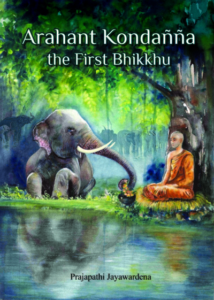
In Sri Lanka
Arahant Kondañña: The First Bhikkhu
Mahamegha is happy to introduce a new English Sadaham publication, written by Prajapathi Jayawardena. The short story Arahant Kondanna: the First Bhikkhu relates the story of Kondanna, who attended to the Bodhisatta during his quest for enlightenment and later became the first Noble Disciple in Gautama Buddha’s Dispensation by listening to the first discourse of the Buddha. A few days later, upon listening to the Anattalakkhana Sutta, Kondanna became an Arahant.
Koṇḍañña took a few minutes to have another look at the delicate, white hair on the forehead, in between the eyebrows of the baby prince, lying in his cradle. The white hair spiraled clockwise to the right. Koṇḍañña’s confidence in its significance grew. Thus with conviction he said, “He will achieve liberation.”
A trace of anger was in the King’s eyes, but he looked at the gathering with a forced smile: “Liberation … liberation for whom? He has every happiness here in this palace … look at this place … who would ever want to leave this?” Everyone nodded in agreement, and a murmur started as everyone looked around the hall. It was a magnificent palace. The high ceiling of the chamber with its grand sandalwood windows and doors, adorned with beautiful carvings, suggested an abundance of wealth. The throne made of gold and silver, decorated with different shades of blue sapphire gems, made comfortable with cotton cushions, spoke of the luxury and comfort of the palace. The breeze which carried the freshness of the Himalayan Mountains kept the castle built in the foothills, fresh throughout the year. It was a known fact that King Suddhodana, though he was a warrior king, was exceedingly kind and considerate towards his servants compared to other Kings of the nation. Therefore, there was no shortage of young servants, dancers and musicians in the palace. The luxurious rooms and ambiance kept its occupants in such comfort that they were unlikely to leave.
“Liberation for humankind, my King,” the Brahmin Koṇḍañña answered before silence fell over the hall once again.
“He could “liberate” everyone while being the Emperor, and he shall be a great Emperor and as he is my son, I say he will stay in my palace and glorify the name of the Sākyans.”
Seeing the tension between the King and Koṇḍañña, an elderly Brahmin stepped forward: “He would only do good for the world … to that, we all agree.”
“Yes, we agree,” all of the hundred and seven Brahmins assented simultaneously. Koṇḍañña stepped back while nodding his head in agreement. King Suddhodana stared at Koṇḍañña, then looked at the elderly Brahmin with a sigh.
“So my king, the most suitable name for your son is Siddhārtha, doer of good.”
“Siddhārtha!” the whole gathering resounded in unison. The king looked pleased, yet troubled.
“Siddhārtha it is,” said the King, picking up his newborn son with much love and tenderness. The Queen joined him and took the beautiful Prince Siddhārtha in her hands.
“I cannot believe this young Koṇḍañña! Why would he say something like that?” said an elderly Brahmin to another.
“If Koṇḍañña were uncertain, he would not have declared definitively the boy’s destiny, after all, he is one of the wisest Brahmins,” said the other.
“One of the wisest, but not the only one,” said the elderly Brahmin angrily. “Yet, we cannot ignore his opinion,” and he made his way to the King, who was absorbed in thought. Together they both withdrew to a quiet corner and sat with heavy hearts. The elderly Brahmin who also acted as counselor comforted the disturbed King. After a while King Suddhodana, looking much relieved, joined the ceremony and sat next to the Queen Mahāmāya who was cuddling Prince Siddhārtha tenderly in her arms.
“Koṇḍañña, is it true? Will he leave the palace … all this luxury?” a young Brahmin asked Koṇḍañña as he was leaving the palace.
“Yes, he will. I must be alert and ready,” replied Koṇḍañña while trying unsuccessfully to hide his overwhelming joy. He made his way out of the palace through the vast throng that had gathered in the garden to see the newborn prince. Koṇḍañña’s happiness was far more significant than the collective joy of the crowd.
29 years later …
“Koṇḍañña! It has happened! He has done it! Prince Siddhārtha left the palace last night!” shouted the young Brahmin Vappa as he came running to the hermitage.
Vappa’s voice startled Brahmin Koṇḍañña from his sleep. It took him a while to process what he had heard. Then, he darted from his chamber towards Brahmin Vappa.
“Prince Siddhārtha left the palace last night,” repeated Vappa. Wise Brahmin Koṇḍañña’s heart jolted with joy, his face beamed, and he sat without a word for a while. Four of his Brahmin students sat next to him anxiously.
“I must follow him,” said Koṇḍañña. “Where did the Prince go? To which city?” he asked Brahmin Vappa.
“No one knows yet. The Prince’s charioteer Channa and his horse Kanthaka are not in the palace. We will know more by the evening. I’ll go back to the palace and await more information,” said Vappa as he headed towards the palace with Brahmin Bhaddiya.
By late evening the Brahmins Vappa and Bhaddiya came back with more news about Prince Siddhārtha. “The King’s soldiers have found Channa while he was returning to the palace, near the city of Ayodhya, and have escorted him back to the palace. He had said that the prince crossed the river Anomā and headed south.”
“He has already passed three counties!” said the Brahmin Koṇḍañña, adding, “I am leaving tomorrow morning, anyone who wishes to join, may do so.”
“We all would like to come with you,” replied the four Brahmins.
It was a long night for Koṇḍañña. He longed to hear this news for quite some time. He remembered the first time he saw Prince Siddhārtha at the naming ceremony. Koṇḍañña was in his early 40’s then, and after 29 years he can still remember how he felt when he saw the newborn baby.


